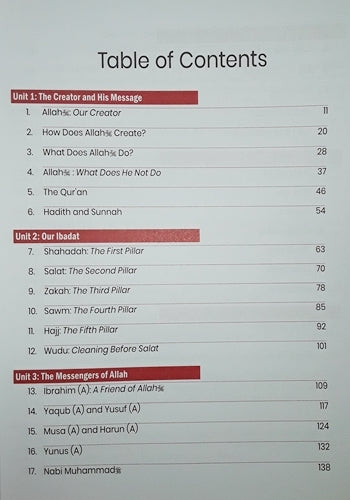
Weekend Learning Islamic Studies Level 2 (Revised and Enlarged Edition)
Original price
$0
Original price
$27.00
-
Original price
$27.00
Original price
Current price
$27.00
$27.00
-
$27.00
Current price
$27.00
This is the Revised and Enlarged edition of Level 2 Islamic Studies Book. This revised edition is Ideally for 7-8-year old, second or third grade students. The children are in their second or third year in a formal Islamic class. This book builds on the knowledge base of the Level 1 book, with an additional emphasis while introducing the basics of Islam. All lessons are presented thematically in distinct units. Unit 1 focuses on the Creator and His message. This unit answers questions about Allāh, Islam, faith, and the Qur’ān. Unit 2 covers topics on our Ibadat-focusing on the five-pillars of Islam. Unit 3 covers the stories of some of the Messengers. Unit 4 covers some other topics about Islam that are relevant for students in this age group. An early undertanding of some of the basics of Islam is presented in this unit. Unit 5 describes proper adab and akhlaq learned from the Qur’ān and authentic sunnah of the Messenger (s). As with the Level 1 book, each lesson begins with a coloring page. The coloring time helps students settle down and be comfortable before the lesson begins. Attention span of children is small; therefore, short paragraphs introduce two or three concepts. This is followed by in-class review section to allow for short break and reinforce learning. Some homework is included in the book, however schools and parents are encouraged to buy a separate workbook that has many more test questions and chapter-based activities.
| Chapter | Topic | Description |
|---|---|---|
| UNIT 1 | THE CREATOR AND HIS MESSAGE | |
| 1 | Allah: Our Creator | Who is Allāh, what and how did He create? Students will learn some essential, but basic facts about AllahI. This introductory lesson prepares students to take necessary step in a structured curriculum in a formal learning environment. |
| 2 | How Does Allah Create? | It seems simple to say Allah creates. But the mechanism and uniqueness of creations is elaborate and precise. Students will learn some of the mechanisms to understand that Allāh’s creation is not similar to the way we make things. We cannot create. The lesson emphasizes this point in a easy-to-understand manner. |
| 3 | What Does Allah Do? | Students leaned that Allāh creates. What else does He do? Once we try to understand many other areas of divine action, we will get a better realization of our Creator. The things that Allāh does for us has profound impact on our survival. This lesson explores many of the things that Allāh does for us. |
| 4 | Allah: What Does He Not Do? | Allāh being most-Powerful, He could do anything He wants to do. There is no doubt about it. But He does not do many things. He does not do many things that we do on a routine basis. Understanding of this point will help students know more about our Creator. |
| 5 | The Qur’ān | After learning about Allah in the next step, students will learn about divine guidance. Students are now introduced to the Qur’ān—the book of guidance. The students will learn some of the basics of the Qur’ān. Who sent it? How long did it take to finish the Qur’ān? What does it have? What are some of its specialities? The lesson answers these questions in simple and easy to understand language. |
| 6 | Hadith and Sunnah | Children often hear about Hadith and Sunnah. This lesson explains them the fundamental difference between Hadith and Sunnah. Why do we follow these? Who collected the Hadith? These basic questions are answered in this final chapter of the Unit 1. |
| UNIT 2 | OUR IBADAT | |
| 7 | Shahadah: The First Pillar | This lesson covers the basics of the first pillar of Islam. Shahadah is the fundamental idea of Islam; without it, one cannot be a Muslim. The core concept of each of the five-pillars is introduced, one pillar at a time. |
| 8 | Salat: The Second Pillar | After declaring Shahadah, the next step is to demonstrate faith in action by performing salat. Therefore, salat is the second pillar of Islam. Performing Salat is a daily duty for all Muslims. This lesson covers the basics of the second pillar. Emphasis is placed on the practice of regular salat. |
| 9 | Zakat: The Third Pillar | Zakat is an important duty upon all qualified individuals who have surplus earning. In this context, students will learn that salat is a personal duty. Zakat is a duty to the community. Thus, Islam is not only about improving the self, it is also about the people around us. This lesson focuses on the third pillar of Islam. Students are encouraged at an early age to learn the value of giving and sharing. |
| 10 | Fasting: The Fourth Pillar | This lesson introduces students to an annual duty of Islam—fasting during Ramadan. Fasting is the fourth pillar of Islam. Fasting creates greater awareness of God. Fasting brings us closer to Allah. In this lesson, students will learn the rules and exception for fasting. |
| 11 | Hajj: The Fifth Pillar | Hajj is a once-in-a-lifetime duty. This lesson explains the basic concept of the fifth pillar of Islam. In this chapter, students will learn the most important steps of performing Hajj. They will also learn about some of the important places where pilgrims visit during Hajj. |
| 12 | Wudu: Cleaning Before Salat | Before we can do salat, we have to make wudu. The steps of wudu are important. In this lesson, students will learn these steps. |
| UNIT 3 | THE MESSENGERS OF ALLAH | |
| 13 | Ibrahim (A): A Friend of Allah | While preaching the message of the Oneness of Allāh, Ibrahim (A) did some extraordinary things. In this lesson, students will learn some of the ways Ibrahim (A) conveyed this message. He debated with his father and a king. These narratives are fascinating, but they also offer great lesson for students. |
| 14 | Yaqub (A) and Yusuf (A) | In the narrative of the father and son messengers of Allah, we can learn an important lesson about forgiveness. AllahI says the account of Yusuf (A) is the best story. Students are introduced to the basic events of Yusuf’s (A) life. Several chapters will expand upon the outline presented in this chapter. |
| 15 | Musa (A) and Harun (A) | The lives and activities of Musa (A) and Harun (A) carry great teachings for us. The Qur’an provides many details of their mission. Learning the basic story of their lives now will help students in the future when they study different aspects of these messengers’ lives. |
| 16 | Yunus (A) | In a dramatic manner, Yunus’s (A) life suddenly turned from good to bad. These accounts not only include breathtaking suspense, but they also contain great inspiration for us. |
| 17 | Nabi Muhammad | The life of Nabi Muhammad cannot be summed up in a few chapters. Throughout the Weekend Learning series, students will learn the different phases and struggles in Nabi Muhammad’s life. Who was he? Why do we respect him? What exactly did he do? This lesson offers a basic outline of Nabi Muhammad’s activities. |
| UNIT 4 | LEARNING ABOUT ISLAM | |
| 18 | Obey Allah and Obey Rasul | The Qur’ān teaches us to obey Allāh and obey Rasūl. This important teaching is presented to students through a story of a team of players winning a soccer game. Their win became possible because they trained under a coach and obeyed him. Similarly, in our daily lives, we can be successful if we train under the guidance of Allāh and obey His teaching and obey our Rasūl, who is like our coach. |
| 19 | Day of Judgment | Belief in the Day of Judgment is an important part of our faith. A large part of the Qur’an focuses on the concept of Judgment Day and Akhirat. This chapter introduces students to the key events on this Day. The idea is not to scare them with the gravity of the event, but to educate them in a manner that is best for their age and guiding them to prepare for this day. |
| 20 | Our Masjid | This lesson uses a story of two young boys who become friends. Together they explore their masjid. They demonstrate how small actions by each person can bring about a nice improvement in the maintenance of their masjid. The story teaches students how they can take care of their masjid. |
| 21 | Islamic Phrases | In this chapter, students will read some common Islamic phrases that people use in their daily lives. They will learn the meaning of these phrases and the specific occasions when they are used. |
| 22 | Food That We May Eat | Islam has very detailed dietary laws. This lesson introduces students to the concepts of halal and haram, and teaches them the types of food that are halal and haram. Understanding these dietary laws will help students avoid prohibited food. |
| UNIT 5 | AKHLAQ AND ADAB | |
| 23 | Truthfulness | Students are taught the value of truthfulness in life. They should learn to speak the truth and realize the rewards for being truthful in life. The sooner students learn the importance of truthfulness, the sooner they will adopt this value. |
| 24 | Kindness | Sometimes the world can be very unkind to us. How do we live in an unkind world but show kindness toward everyone and everything? Islam teaches us to adopt kindness toward everything around us. Kindness teaches students not to be selfish and not to be oblivious to the world around them. |
| 25 | Respect | This lesson teaches students the importance of showing respect to the people around them. They will also learn how to properly show respect. |
| 26 | Responsibility | In this chapter, students are introduced to the value of responsibility. How can responsibility make a person successful in life? How can an irresponsible life jeopardize a person? Students will learn the importance of being responsible regarding different matters in life. This is one of the values that makes an ordinary person successful in life. |
| 27 | Obedience | Islam requires us to show obedience to Allah and our Rasul. There are other forms of obedience that are also important. Obedience is one of the character traits that makes a person a good individual. |
| 28 | Cleanliness | The cleanliness of our bodies, minds, and surrounding environment is important for healthy living. Islam emphasizes that cleanliness be maintained in all aspects of life. This lesson introduces the basics of how we can maintain cleanliness. |
| 29 | Honesty | Honesty and truthfulness go hand in hand. If truthfulness is about speaking the truth, then honesty is about behaving in a truthful manner. Our everyday life offers plenty of opportunities to display honesty or dishonesty. An early understanding of the value of honesty will help shape the lives of students in an ideal manner. |







